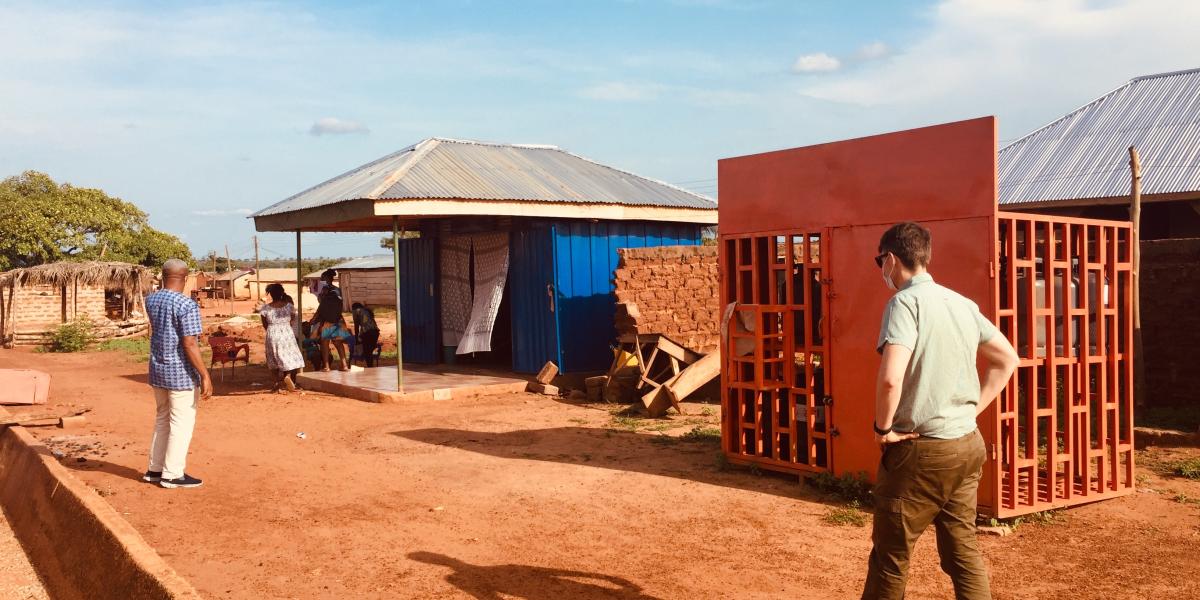
Pictured above: an LPG fuel depot "cage" built by the project team in the Ghanaian countryside (PC: F. Malagutti)
In Ghana, about 80% of households cook by burning biomass like wood, charcoal, and crop residue in open fires. Variants of similar traditional methods are employed by nearly 3 billion people around the world, and the resulting air pollution from these fuels has devastating impacts on human health.
According to the World Health Organization, an estimated 4 million preventable deaths occur every year as a result of burning biomass for cooking, and lower respiratory tract infection, which is highly associated with inhaling smoking from traditional fuels, is the 3rd leading cause of death in Ghana.
While there have been significant public and private investments in efforts to encourage the use of “clean” cooking technology over the last decade, relatively modest progress has been made in terms of sustained community-wide transitions to alternative fuel sources like liquified petroleum gas (LPG) - or propane, as it is called in the United States.
“In addition to financial barriers, there is a lot of misinformation about the safety of LPG,” says PhD student and emLab Graduate Student Researcher Flavio Malagutti. “There are concerns about children fiddling with the tanks and causing accidents or burning themselves, but according to our household surveys, burns and injuries are actually more frequent in households that use traditional fuels.”
Despite the known health effects, preferences and behaviors are notoriously difficult to shift, especially for an activity as culturally-rooted as cooking. In an effort to achieve substantial improvements in air quality and health, Malagutti is working with emLab People & Poverty Program Director Kelsey Jack and collaborators at Columbia University and the Kintampo Health Research Centre in Ghana on a 5 year project managed and supported by Columbia World Projects to determine how policy interventions can incentivize a community-wide transition to cleaner cooking.
The research team recently conducted a nationally representative sample of over 7,500 household surveys to assess demand for clean cooking technologies and to better understand barriers to adoption in Ghana. Early findings point to accessibility, transaction costs and financial constraints as the main potential barriers to LPG adoption.
Purchasing and transporting LPG tanks can be a challenge for Ghanian households in rural or peri-urban locations, and when the traditional alternative is simply collecting wood, which requires no monetary expenditure, or purchasing coal from a conveniently located street vendor, there may not be enough incentive to pursue a “clean” alternative.
In an attempt to evaluate the access barrier, the research team built LPG depots in a range of rural and urban locations that are more conveniently located for rural households than existing filling stations. With these pilot fuel depots in place, the team can examine how facilitating access to LPG might incentivize households to transition to using clean energy fuels, and if successful, may aid the implementation of policies and subsidies aimed at enhancing access.
In an adjacent study, the research team is creating a mobile platform to improve connectivity between consumers and sellers in the LPG market and to test the introduction of some financial products targeted at LPG consumption.
“We noticed that the supply side operates with very little information about their current and potential mass of customers. On the demand side, consumers could benefit greatly from having access to delivery services, savings accounts, or even small, short-term credit lines for when they run out of gas,” Malagutti explains. “Mobile payments are ubiquitous in Ghana. We are really excited about leveraging this technology to potentially improve the market for clean energy fuels.”
Learn more about emLab’s ongoing research efforts to help combat household air pollution in Ghana with clean fuel alternatives here.



